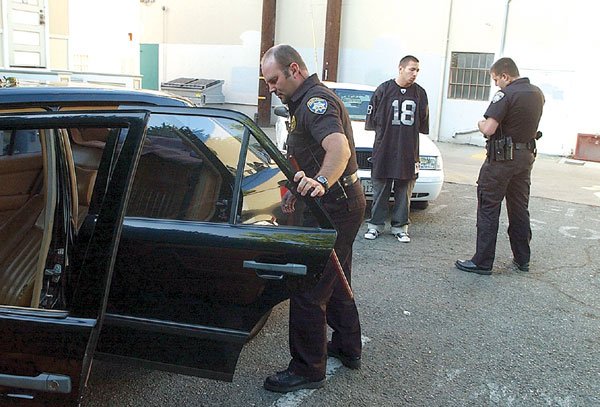Gilroy
– The sun was just starting to dip behind the hills west of the
city when two police cars parked outside a house on Martin
Street.
Four uniformed officers crossed the home’s front lawn. The
members of the Gilroy Police Department’s gang unit, the Anti-Crime
Team, didn’t know what they would find at the house, but were
seeking a man living there who they knew was on parole, making
himself and his residence open to search at any time.
By Lori Stuenkel
Gilroy – The sun was just starting to dip behind the hills west of the city when two police cars parked outside a house on Martin Street.
Four uniformed officers crossed the home’s front lawn. The members of the Gilroy Police Department’s gang unit, the Anti-Crime Team, didn’t know what they would find at the house, but were seeking a man living there who they knew was on parole, making himself and his residence open to search at any time. They prepared for the unexpected, two walking up the front steps toward the door, one hanging back, and another heading toward a side gate leading to the back yard.
If someone runs, that’s the guy we’re looking for, they said.
As it turned out, when a woman answered the front door, they didn’t find the parole violator. Instead, they found seven people inside, and 1 gram of methamphetamine on top of a dresser.
They found another gram of meth inside one of the women’s purse, after getting permission to search it.
“What do you think his parole officer would say if she heard he was living in a house with this stuff around?” Officer Joseph Deras asked the people sitting in the living room. “It’s probably not good for him if he’s living with this dope in the house.”
The ACT officers also ended up placing two men in the back yard in handcuffs – one who admitted he was high on methamphetamine – while they searched them.
The stop was the first of five scheduled last Friday night, and resulted in two arrests for possession of methamphetamine: Monica Santos Castillo, 24, of 15880 Hill Road #11, in Morgan Hill; and Adea Shanna Calimpong, 27, of 798 Gary St.
Deras told the residents to expect the officers another night.
Searching parolees is just one focus of the six-member ACT team, which also includes Officers Randy Bentson, Pedro Espinoza and Jeff Roccaforte; Cpl. Erik Tiner; and Sgt. Greg Flippo. Gangs are their focus – enforcement, investigations, and intelligence. One ACT member is the juvenile liaison, and works closely with Gilroy schools. Another handles car thefts, and one is dedicated nearly full-time to narcotics investigations.
“The way we see it, most of the crime committed in Gilroy is committed by gang members,” Roccaforte said in an interview Thursday. “We try to investigate the gangs at all different angles of what they do.”
ACT is a five-year assignment, and most current members have one or two years under their belts. Most of them are on the GPD’s Special Operations Group, it’s SWAT team. Because they work on special assignments, their hours are flexible. They take pride in their intimate knowledge of the city’s six gangs and hundreds of gang members.
Driving through Gilroy streets conducting “gang suppression” last Friday, Deras and Roccaforte identified gang’s territories by block, street, apartment complex, and even individual residences.
“We talk to them, get intelligence, learn their culture, what’s going on the street,” Roccaforte said. “All of our contacts are not to arrest them.”
That knowledge somewhat runs both ways.
“They know us personally and they know the car,” Deras said of the white Ford Crown Victoria ACT members drive. The car is unmarked, but looks and is equipped like a regular patrol car, with lights, sirens, a radio, and an M-4 urban police rifle attached to the underside of the roof. “They see us coming and they run.”
Moments after the car left the police station, Deras and Roccaforte spotted a 19-year-old they arrested in March for selling marijuana to juveniles. Deras called the station to find out if the man, Joey Fraga, was on probation or parole yet. Although he wasn’t, he saw the officers behind his car and pulled into an alley, where he parked. Fraga was out of his black Mercedes and walking toward the officers as they got out of their car.
He gave them permission to search, but then resisted, cussed at them, and tried to return to his car. When he continued to resist, Roccaforte placed him in handcuffs and spoke with him while Deras searched the car.
“I got my (stuff) together,” Fraga said, smiling to show off his white-gold-plated teeth. “I learned my lesson. If you guys wouldn’t have busted me, boss, I would probably still be doing that.”
ACT has been keeping the heat on local gang members and drug dealers since the task force was created in the mid-1990s, when gang violence was much more frequent. Since then, the team has been credited with proactively reducing the number of dangerous gang members on the city’s streets. They have some help in following trends from nearby police departments, meeting with Morgan Hill, Hollister, Watsonville, and Salinas once a month.
“A lot of gang members cross over,” particularly Sureño gang members rather than Norteños, Roccaforte said.
Those contacts in other police departments make it more difficult for gang members to hide in neighboring communities, he said.
But Friday nights in general are dedicated to parole searches. ACT officers pick a random handful of the 260 parolees living in Gilroy for searches each week. Depending on the type of restrictions placed on the person – many, for example, can’t have alcohol – officers may arrest the parolee, or housemates.
“All we’re doing is checking up on them and making sure they’re obeying all the terms of their parole,” Roccaforte said.
“It also sends the message that the task force is here, and if I screw around, the task force is going to come after me,” Deras said.
With the exception of last week, a parole officer accompanies ACT investigators out on the streets each Friday. A probation officer, Bernadette Gonzalez, is assigned to the GPD full-time and often joins the team, as well. Many larger departments don’t have that luxury, Roccaforte said.
The result: More parole and probation violators get identified and taken into custody quickly. If ACT members are unsure about a parolee’s status, their questions will be answered with a phone call.
“We have a very good relationship with parole and probation, so we have a lot of contact with agents,” Roccaforte said in an interview Thursday.
That close relationship offers advantages not seen in other departments, he said. If a parole officer issues a warrant for someone’s arrest, he or she will inform ACT members, and finding that criminal will become a top priority for the team. With probation or parole agents joining them on assignments, ACT members have more information about violators, and sometimes are afforded more cooperation because of the agent’s personal relationship with them.
“We’re real lucky, no question about it,” Deras said.















